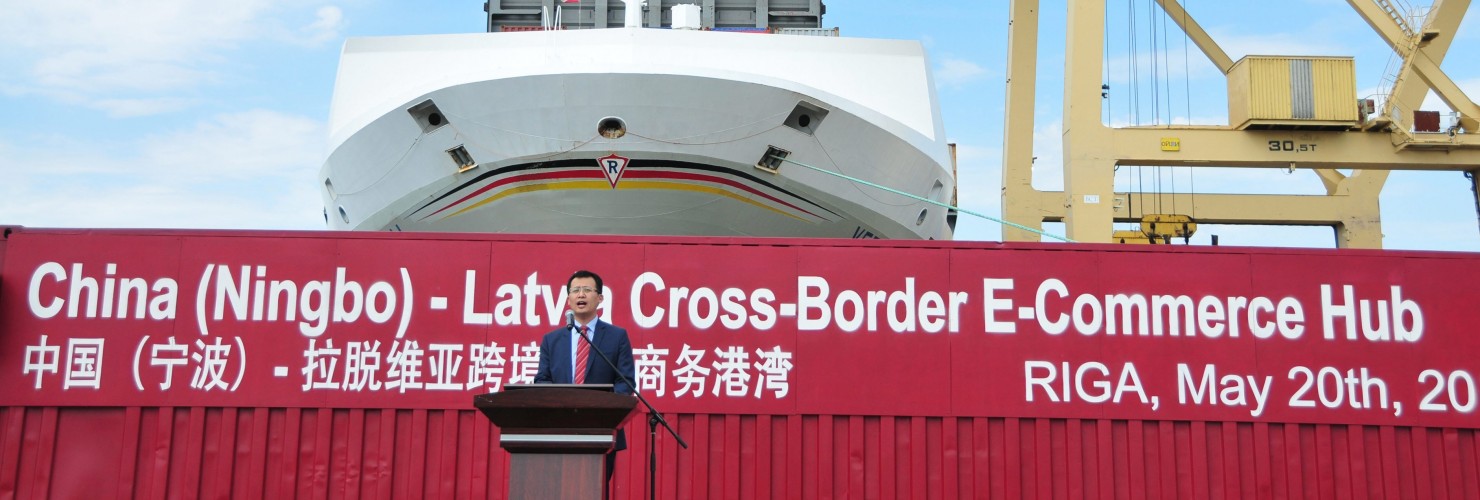

A Baltic view on transatlantic tech relations towards China
Cooperation in high-tech has been on the Sino-Baltic agenda since the beginning of China's engagement with the region in early 2010s. The Baltic states had no need for China's loans, they believed high value-added cooperation could instead be established in cutting edge sectors with a complementarity between China's technological development and the Baltics highly educated work force, low production costs, and digital orientation. This framework was supported, at least at a symbolic level, within all three states, Estonia, Latvia and Lithuania.
Building on Estonia's image of e-savviness, China and Estonia signed a Digital Silk Road Memorandum of Understanding in 2017. The document promised "the development of e-commerce ecosystems, digital services, the exchange of technical information as well as facilitating the connectivity of logistics and trade information." While not directly related to the political process of Sino-Baltic exchanges, a concrete example of cooperation in tech had taken place earlier that year as China's Didi Chuxing became a strategic partner to Taxify (now known as Bolt), an Estonian-founded ride-sharing company.
Lithuania, in its turn, was chosen as the site of the Fintech cooperation secretariat within the "16+1" (later known as "17+1") format between China and the Central and Eastern European states. In 2018, Vilius Šapoka, the then-minister of finance, called the decision "a perfect example that China and Central and Eastern European countries are linked by common interests, i.e., creation of attractive environment for financial innovations and promotion of development of innovative business."
Although Latvia had aimed lower and prioritised cooperation in logistics rather than high-tech through "16+1", the message towards cooperation in tech still bore fruit. In 2019, following a EUR 15 million investment from BGI Group, a bio-tech genome sequencing giant out of Shenzhen, a gene-sequencing equipment production facility was opened in the country.
Although scattered across different technology fields and different in size, these examples nevertheless demonstrate a joint initial determination by the Baltics to take advantage of China's technology. By 2018, however, this had changed as the broader discourse around China shifted from being a national issue to a keystone of transatlantic alliance.
The Huawei and NucTech decisions set a precedent for clear geopolitical lines
When Estonia, Latvia and Lithuania signed Joint Declarations and MoUs on 5G security with the United States in 2019 and 2020, pledging to take "into account risk profile assessments" and to conduct "careful and complete evaluation of component and software providers", the message was clear. The Baltics, along with several other European Transatlanticist states, had made a decision to move away from strategic ambiguity surrounding Huawei and into a clear-cut geopolitical position – namely, US-led security first, EU aspirations for strategic autonomy second.
As the Estonian Minister of Foreign Affairs put it at the time: "It is important to make sure that the development of European defence cooperation complements the European security architecture based on transatlantic ties instead of attempting to replace it. Also, the debate around the strategic autonomy of Europe should not become an unnecessary irritant in transatlantic relations."
The Baltic distrust in the prospect of an autonomous Europe was exacerbated as the French president Emmanuel Macron, the main proponent of the idea, called for more dialogue with Russia, a country considered the number one security threat to most Baltic countries. As a more hawkish line on China was one of the core American requests, the period of pragmatic economic exploration of China was ended, and the narrative of the rise of China as a security threat had begun.
Security, not business, immediately became the main framing of tech cooperation with China in the Baltics: first, in Lithuania, then rapidly followed by Estonia and Latvia. And, if the decisions to exclude Huawei from national 5G networks did not particularly stand out from a larger EU-wide position, the Lithuanian decision to block the Chinese state-owned security inspection equipment manufacturer Tongfang Technology Ltd. (NucTech) from installing airport surveillance equipment in 2021 placed the region among the most China-suspicious and US-supportive EU members.
NucTech had previously received contracts in Latvia (the equipment was allegedly purchased for the use at Latvian customs, not airports) and Lithuania, among a long list of other European countries from 2007/08. It was the most reasonably priced product on offer. NucTech's pricing strategy has consistently been under market rates – so much so, that the EU accused the company of dumping in 2010. The issue had been solved by establishing production grounds right next to the Baltic countries in Warsaw, Poland. The prices increased, but were still competitive, contributing to the spread of NucTech equipment across Europe. Therefore, the company winning the Lithuanian bid was not extraordinary.
Ultimately, however, the Lithuanian government cancelled the contract. The government explained the decision as a matter of national security: "The government's decision is that the deal is not in line with national security interests," Rasa Jakilaitienė, the prime minister's spokeswoman commented on the matter.
The Lithuanian decision had come directly after the US had added NucTech to the List of entities that "have been involved, are involved, or pose a significant risk of being or becoming involved in activities contrary to the national security or foreign policy interests of the United States" in late 2020. The blacklisting was followed by the "campaign led by the [US] National Security Council and a handful of US agencies...trying to rally European governments to uproot NucTech Co." Mindful of the importance of its alliance with the US, the Lithuanian government decided to block the contract. And Lithuania is by no means a Baltic outlier in this regard. Sources indicate that, if faced with a similar dilemma, both Riga and Tallinn would make the same decision.
A similar narrative has played out against Huawei throughout the region, reflecting a clear indication that the Sino-Baltic tech relations are considered a transatlantic affair. The decisions against Chinese tech companies directly feed into Baltic transatlantic commitments and serve as an illustration of the clear geopolitical lines the three small Baltic countries have set themselves.
The future of Big PRC Tech in the Baltics -- the unavoidable security prism
Some nuance in policies aside, all three Baltic countries have displayed largely similar perception of China's role in the region. They are keen to explore high value-added economic opportunities while avoiding granting China any increase in political influence. They do not seek to use Beijing as leverage against Brussels, and, most importantly, remain firm on transatlantic commitments. The tech dimension is particularly significant as this was going to be a major focus of relations between the Baltic states and China.
As US-China tensions are the expected to continue and the dilemmas surrounding cooperation with China in technology are creeping ever more into international security discourse, the Baltic states of Lithuania, Latvia, and Estonia are increasingly opting out of collaboration with China in tech. They are consciously choosing a transatlantic alliance over EU aspirations of strategic autonomy or the more permissive agenda advanced by big European economies. For Vilnius, Riga and Tallinn, Washington stands tall as their most significant security partner.
This article was first published on the RUSI Transatlantic Dialogue on China Blog on April 22, 2021.
The views expressed in this article are those of the author and not necessarily reflect those of the Mercator Institute for China Studies.

